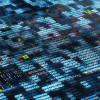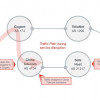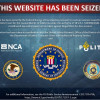Cyber War 2001: Hacking the enemy to pieces
As the world waits for a traditional military response to the Sept. 11 terrorist attacks, troops have been quietly deployed in an emerging theatre of conflict: cyberspace. Dubbed "infowar troops," "cyber warriors" or the more formal "information warfare specialist," these newest members of the military are more likely to brandish software, computer viruses, signal-jamming techniques and a computer hacker's mindset and toolbox than to carry a gun or a grenade.
And their increasing presence in modern warfare is hotly debated by the military and watchdog groups who question who should control them, what limits can be placed on their high-tech toys and whether, in fact, there are enough of them to protect government and commercial infrastructure from a major cyber-terrorist attack...
War 2001: hacking the enemy to pieces
In the information age, the battleground is cyberspace and troops are computer-savvy
by KRISTA FOSS
"This is the new face of warfare," said Marcus Rogers, a Winnipeg-based researcher and author on terrorism, cyber terrorism and information warfare and the director of secure e-business for the accounting firm Deloitte & Touche. "We need to play on an even battleground in this new era of network-centric warfare -- other nations are certainly developing the capacity."
He says information warfare specialists are being used defensively, offensively and to enhance traditional military operations.
The National Defense University's school of information warfare and strategy, based in Washington, is one of many institutions that trains this new generation of soldier in computer sciences, engineering and systems operations.
The school's official definition of information warfare is "actions taken to preserve the integrity of one's own information systems from exploitation, corruption or destruction while at the same time exploiting, corrupting or destroying an adversary's information systems and in the process achieving an information advantage in the application of force."
In the Sept. 11 attacks, four hijacked passenger jets were crashed in New York, Washington and Pennsylvania, killing more than 5,000 people. Islamic militant Osama bin Laden and his organization, al-Qaeda (The Base), are the prime suspects.
The U.S. information warfare specialists, employed in the armed forces and working jointly with the Federal Bureau of Investigation, would have been the first to spring into action, Mr. Rogers said.
"Information warfare specialists would be scanning microwave and radio frequencies, intercepting cellphones and satellite transmissions, monitoring the Internet and scouring cyberspace for any information as to the whereabouts of bin Laden and al-Qaeda," he said.
"They would be looking for signs of the defensive posture of al-Qaeda and any supporting nations and for evidence of counterstrike capability.
"They would also be tracking down bank accounts, and possibly wiping them out electronically, if they are used to fund the terrorists."
Canada's military has been criticized for its lack of sophistication and resources in traditional military hardware: jet fighters, tanks and smart bombs. But its lack of information-warfare capability is also a concern.
"There are signs we are doing well and signs that we are not doing well," said Robert Garigue, a former military officer who until 1998 worked for the Department of Defence developing ways to protect Canadian military systems from cyber terrorism and who is now vice-president, security, for the Bank of Montreal in Toronto.
"One of the things the military doesn't do right now is have an information career path for officers. Is there enough people? Well, no. Because we are becoming more and more dependent on computers."
The foundations of daily life in Western society -- banking, stock exchanges, transportation controls, utility grids and nuclear power stations -- depend on a vast, networked information infrastructure. The potential for destabilizing a society through cyber attacks against banking or telecommunications systems becomes huge, Mr. Rogers said.
Two years ago, two professional soldiers in China's People's Liberation Army proposed a new way of waging war. Colonels Qiao Liang and Wang Xangsui published a new military strategy calling for "unrestricted war" and advocated using terrorist and cyber attacks on critical infrastructure as a way to keep a superpower adversary reeling.
Still, Roger Molander, a senior researcher with Rand's National Defense Research Institute in Santa Monica, Calif., isn't ready to get into a lather about a potential cyber-terrorist attack from bin Laden supporters. He questions whether they have the sophistication. "It's still down the road. Or at least we still think it's down the road."
SNP.









































































